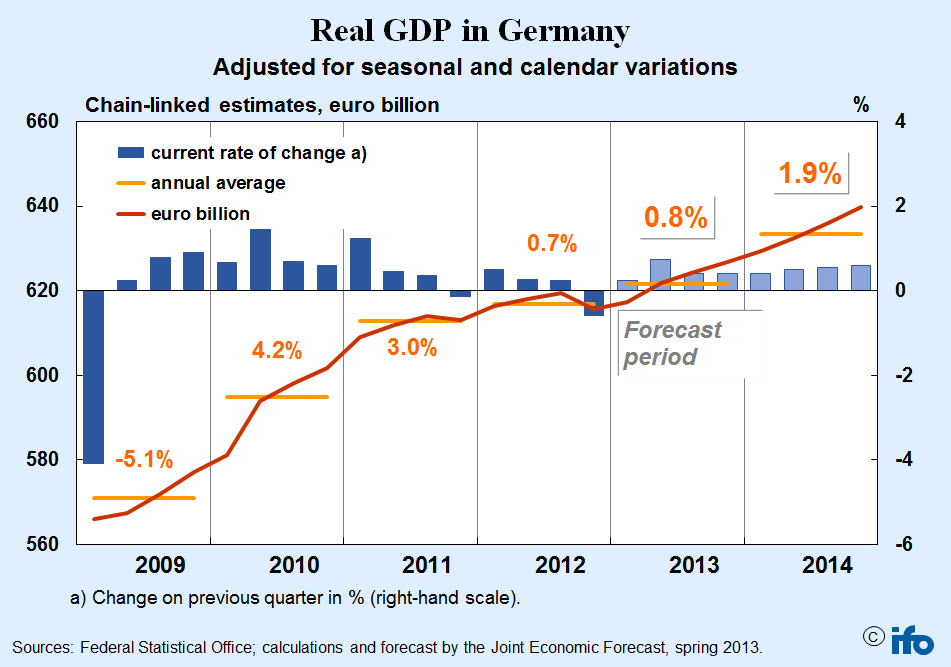Germany GDP and Economic Facts
Post on: 16 Март, 2015 No Comment

U.S. President Barack Obama (R) and German Chancellor Angela Merkel arrive to pose with other leaders for a group photo during the G20 summit on September 6, 2013 in St. Petersburg, Russia. Leaders of the G20 nations made progress on tightening up on multinational company tax avoidance, but remain divided over the Syrian conflict as they enter the final day of the Russian summit. Photo by Anton Denisov/Host Photo Agency via Getty Images
In 2013, Germany’s economy produced $3.085 trillion in as measured by Gross DomesticProduct (GDP). This makes it the world’s sixth largest economy. after the United States, European Union (EU). China. India and Japan. (To compare GDP between countries, you must use Purchasing Power Parity .)
Its GDP growth rate was 1.6%, about half the 2.8% rate in 2012, but better than the 4.7% decline in 2009. Germany’s GDP per capita was $52,800 — lower than in the U.S.
- Modernization of Eastern Germany, which initially cost $70 billion per year, and still ran $12 billion in 2008.
- High unemployment (9.5%) and an aging population (20% age 65+) means Germany depletes Social Security faster than can be added via payroll taxes.
- Germany managed to get its budget deficit below 3% of GDP, as mandated by the EU. It lowered fiscal spending, which it what it advocates to solve the Greece debt crisis .
Germany’s Economy Benefits From Its Eurozone Membership:
Germany benefited from its membership in the EU, and its adoption of the euro. Like many other eurozone members, the power of the euro meant interest rates stayed low, which spurred investment. In fact, many say Germany profited the most from its membership. Its strong manufacturing base meant it had plenty to export to other members of the eurozone, and could do so more cheaply. This gave German companies a competitive advantage. which only improved over time. The resultant prosperity meant that German consumers had more money to buy more locally. As a result, the domestic market has recently become a more significant driver of economic growth .
German Chancellor Angela Merkel:
Current Chancellor Angela Merkel was a low-key physicist and economic reformer from East Germany. She won the 2005 election by promising reform to lower the unemployment rate. high even before the recession. In fact, her efforts lowered it from 11.5% to 9.5%. She had to move cautiously to keep the other members of her coalition on board.
The recession allowed Merkel to successfully push through stimulus efforts and tax cuts. but this increased Germany’s budget deficit to 3.3% — a violation of the EU’s 3% debt-to-GDP ratio. Austerity measures put in place should lower the deficit to 2.5% in 2011. This includes a sales tax increase and higher taxes on the wealthy. This was necessary to raise the revenue needed to decrease Germany’s budget deficit to within the EU’s budget guidelines. This success means that Merkel pushed for austerity measures to resolve the Greece debt crisis. Opposition to her leadership delayed resolution, which resulted in its expansion to a eurozone debt crisis .
Why Was German Unemployment High?:
Unemployment in 2010 was 7.1%, better than during the recession when it was 7.7%. However, Germany struggles with unemployment because of historical and even cultural reasons. First, Germany has laws which make it difficult to lay off workers and lower wages. Second, the reunification of East and West Germany after the fall of the Berlin Wall also heightened unemployment, as the economy had to absorb workers for the former Communist bloc. Third, the uncertainty caused by high unemployment means that export growth does not translate into domestic spending. Both businesses and people tend to save for the rainy day rather than boost the economy by spending .
Unemployment would have been worse in Germany were it not for reforms launched in 1998-2005. In addition, the government subsidized reduced working hours, which kept people employed during the recession although only part-time.
German-Russian Relations Are Unique
While President of the EU in 2007, Merkel met with Russia’s President Vladimir Putin at his personal country retreat, Bocharov Ruchei in Sochi. Merkel and Putin enjoyed a fairly cordial relationship. That was thanks to Putin’s fluency in German and Merkel’s schooling in then-Communist Eastern Germany, which gives her a good command of Russian.
Merkel arrived just one week after Russia cut off gas supplies to Belarus, which carried the main pipeline to Europe. Merkel got assurances that Putin’s pipeline politics would not affect the EU’s or Germany’s energy supply. Russia does not want to jeopardize German foreign direct investment in Russia or bilateral trade.Putin also agreed to:
- A new EU-Russia Partnership and Cooperation Agreement.
- Acceleration of a gas pipeline construction to Germany under the Baltic Sea.
- Construction of an oil pipeline leading to Russia’s Pacific Coast, to avoid going through “transit countries” Ukraine, Belarus and Poland.
- Establishment of a gas reservoir in Germany, adding a new distribution center for Russian gas.














